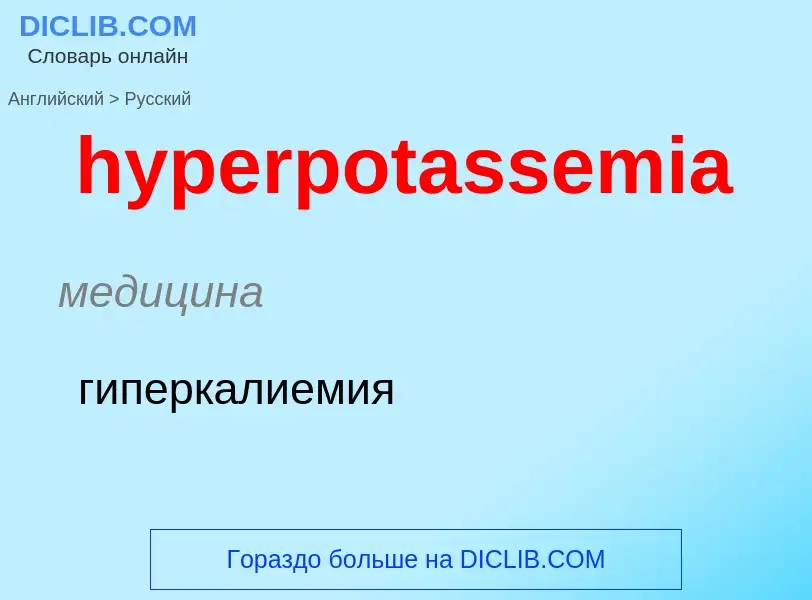Übersetzung und Analyse von Wörtern durch künstliche Intelligenz ChatGPT
Auf dieser Seite erhalten Sie eine detaillierte Analyse eines Wortes oder einer Phrase mithilfe der besten heute verfügbaren Technologie der künstlichen Intelligenz:
- wie das Wort verwendet wird
- Häufigkeit der Nutzung
- es wird häufiger in mündlicher oder schriftlicher Rede verwendet
- Wortübersetzungsoptionen
- Anwendungsbeispiele (mehrere Phrasen mit Übersetzung)
- Etymologie
hyperpotassemia - Übersetzung nach russisch
медицина
гиперкалиемия
медицина
гиперкалиемия
Wikipedia
Hyperkalemia is an elevated level of potassium (K+) in the blood. Normal potassium levels are between 3.5 and 5.0 mmol/L (3.5 and 5.0 mEq/L) with levels above 5.5 mmol/L defined as hyperkalemia. Typically hyperkalemia does not cause symptoms. Occasionally when severe it can cause palpitations, muscle pain, muscle weakness, or numbness. Hyperkalemia can cause an abnormal heart rhythm which can result in cardiac arrest and death.
Common causes of hyperkalemia include kidney failure, hypoaldosteronism, and rhabdomyolysis. A number of medications can also cause high blood potassium including spironolactone, NSAIDs, and angiotensin converting enzyme inhibitors. The severity is divided into mild (5.5–5.9 mmol/L), moderate (6.0–6.4 mmol/L), and severe (>6.5 mmol/L). High levels can be detected on an electrocardiogram (ECG). Pseudohyperkalemia, due to breakdown of cells during or after taking the blood sample, should be ruled out.
Initial treatment in those with ECG changes is salts, such as calcium gluconate or calcium chloride. Other medications used to rapidly reduce blood potassium levels include insulin with dextrose, salbutamol, and sodium bicarbonate. Medications that might worsen the condition should be stopped and a low potassium diet should be started. Measures to remove potassium from the body include diuretics such as furosemide, potassium-binders such as polystyrene sulfonate and sodium zirconium cyclosilicate, and hemodialysis. Hemodialysis is the most effective method.
Hyperkalemia is rare among those who are otherwise healthy. Among those who are hospitalized, rates are between 1% and 2.5%. It is associated with an increased mortality, whether due to hyperkalaemia itself or as a marker of severe illness, especially in those without chronic kidney disease. The word hyperkalemia comes from hyper- 'high' + kalium 'potassium' + -emia 'blood condition'.

